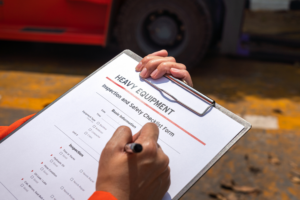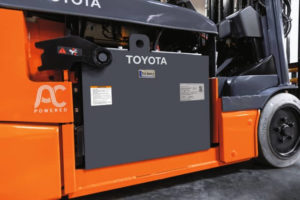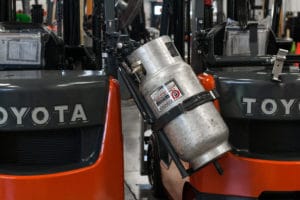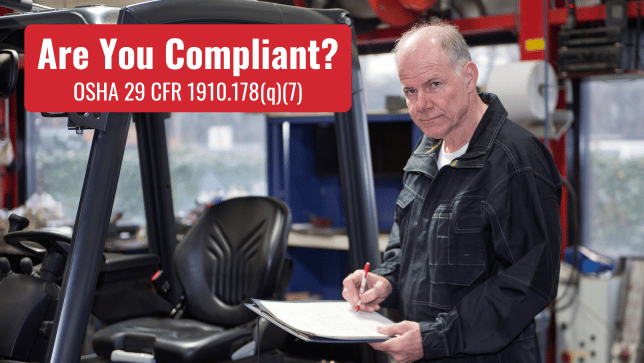Proper forklift inspections are the key to a safe and productive forklift fleet. They also ensure that operators and pedestrians can safely work in their environments. A single component malfunction in a forklift can lead to substantial damage to products or facilities, or in the worst-case scenario, it can result in injury or loss of life. This guide is compiled with information directly from OSHA, offering clear guidance on inspecting a lift truck before each shift.
29 CFR 1910.178(Q)(7)
OSHA mandates daily examinations for all forklifts before their use. Forklifts utilized continuously must undergo inspection after each shift.
Before starting the forklift, the operator should conduct a visual check with the key off, followed by an operational check with the engine running. The forklift should not be placed into service during this shift if either check indicates potential safety issues.
As a reminder, do not drive any vehicle in need of repair, defective, or unsafe in any way. Instead, take it out of service immediately and report and document any issues.
As quoted from OSHA:
“Industrial trucks shall be examined before being placed in service, and shall not be placed in service if the examination shows any condition adversely affecting the safety of the vehicle. Such examination shall be made at least daily.
Where industrial trucks are used on a round-the-clock basis, they shall be examined after each shift. Defects when found shall be immediately reported and corrected.” [29 CFR 1910.178(q)(7)]
PRE-OPERATIONAL INSPECTION

Before starting your vehicle, conduct a thorough pre-operation (or pre-start) inspection. This inspection covers various items, including but not limited to:
- Fluid Levels: Check oil, water, and hydraulic fluid levels.
- Visual Examination: Look for leaks, cracks, or any visible defects, paying attention to hydraulic hoses and mast chains. Note: Avoid placing hands inside the mast; instead, use a stick or another device to check chain tension.
- Tire Condition: Inspect tire condition and pressure, checking for cuts and gouges.
- Forks Condition: Assess the condition of the forks, ensuring the top clip retaining pin and heel are intact.
- Load Backrest Extension: Verify the condition of the load backrest extension.
- Finger Guards: Check the presence and condition of finger guards.
- Safety Decals and Nameplates: Ensure all warning decals and plates are in place and legible. Verify that the nameplate information matches the model and serial numbers, as well as attachments.
- Operator Manual: The operator manual is present on the truck and legible.
- Operator Compartment: Inspect for grease and debris in the operator compartment.
- Safety Devices: Ensure all safety devices, including the seat belt, are functioning correctly.
Depending on the forklift type (electric or internal combustion, including liquid propane), additional items may need inspection as specified in the manufacturer’s guidelines.
ELECTRIC FORKLIFTS

An electric forklift is powered by rechargeable batteries, making it environmentally friendly and ideal for indoor use. It offers quiet operation, low maintenance, and precise handling, making it well-suited for various material handling tasks in warehouses and manufacturing facilities.
Preoperational Inspections include:
- Cables and connectors for frayed or exposed wires
- Battery restraints
- Electrolyte levels
- Hood latch
Note: Always use personal protective equipment such as a face shield, rubber apron, and rubber gloves when checking electrolytes.
INTERNAL COMBUSTION FORKLIFTS

An internal combustion forklift runs on gasoline, diesel, or propane, suited for outdoor and heavy-duty tasks. It offers robust performance and quick refueling, ideal for construction sites and shipping yards.
Preoperational Inspections include:
- Engine oil.
- Brake reservoir.
- Engine coolant.
- Air filter.
- Belts and hoses.
- Radiator.
- Hood latch.
- Liquid Propane Forklifts.
- Properly mounted tank.
- Pressure relief valve pointing up.
- Hose and connectors.
- Tank restraint brackets.
- Tank for dents and cracks.
- The tank fits within the profile of the truck.
- Leaks.
Note: Always use personal protective equipment such as a face shield, long sleeves, and gauntlet gloves when checking liquid propane tanks and fittings.
OPERATIONAL INSPECTION
After completing the pre-operation inspection, operators should conduct an operational inspection with the engine running. This inspection includes:
- Accelerator linkage.
- Inch control (if equipped).
- Brakes.
- Steering.
- Drive control: forward and reverse.
- Tilt control: forward and back.
- Hoist and lowering control.
- Attachment control.
- Horn.
- Lights.
- Back-up alarm (if equipped).
- Hour meter.
REQUIREMENTS AND RECOMMENDED PRACTICES
The OSHA-powered industrial truck standard [29 CFR 1910.178] lists several conditions when a forklift needs to be out of service. If the operator notes these conditions while driving, the operator must stop, park the vehicle, and get assistance.
“Any powered industrial truck not in safe operating condition shall be removed from service. All repairs shall be made by authorized personnel.” [29 CFR 1910.178(q)(1)]
“Defects must be immediately reported and corrected.” [29 CFR 1910.178(q)(7)]
“Any vehicle that emits hazardous sparks or flames from the exhaust system shall immediately be removed from service, and not returned to service until the cause for the emission of such sparks and flames has been eliminated.” [29 CFR 1910.178(q)(8)]
“When the temperature of any part of any truck is found to be in excess of its normal operating temperature, thus creating a hazardous condition, the vehicle shall be removed from service and not returned to service until the cause for such overheating has been eliminated.” [29 CFR 1910.178(q)(9)]
“No truck shall be operated with a leak in the fuel system until the leak has been corrected.” [29 CFR 1910.178(p)(4)]
Remember, while conducting a thorough inspection of your lift trucks every shift might feel time-consuming, regularly inspecting and servicing your forklift fleet leads to increased productivity. Less bang-ups mean leaner maintenance outlays; watch as this combination steadily bolsters your organization’s financial health. For professional-grade forklift services, from check-ups to repairs, consider giving our seasoned pros at Conger Industries a shout. With locations in Green Bay, Neenah, and Wausau, we are conveniently situated to serve your needs. Explore our services further by visiting our page.
